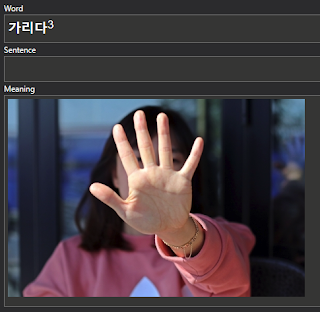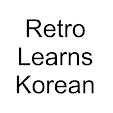Anki and Anki Settings
I'm going to presume you found this article because you have downloaded Anki but are looking to find some decks to use with it. The decks I have made are for varying levels so please take a look and download the ones that you believe would be best for you. Most of the decks have audio and contain a picture one the front and sentence on the back. Anki has a lot of personalisation and for good reason, every one will always have a preference for 1 setting over another, so it is always good to experiment with new settings so that you can find what works for you.
 |
| The Anki settings that I use. |
Starter Decks
TTMIK's First 500 Korean Words by Retro [pictures+audio]
Recommended new cards: 20-25 per day
![Typical card from the 500 words deck. TTMIK's First 500 Korean Words by Retro [pictures+audio] example](https://blogger.googleusercontent.com/img/b/R29vZ2xl/AVvXsEilw0aMzHEYqxLAwrcF6_GNOtr147vdoBa1pGg3IAsNfBVo3F-JZzz-CcfccoGnn-ikrKcKLQ4cLgCFwW2TZdvVJ4lXGBQqHcY6JZEiO-sRqyV7lRZm040-QIM0mkHjRQ5ohTFLmOHxHqxA/w400-h338/500+beginner+words+deck+example.png) |
| Typical card from the 500 words deck. |
This deck is great for those just starting out. It has word and the audio on the front to help with reinforcing the sounds of 한글. I would suggest doing this deck while reading through grammar lessons as this will help build vocabulary which is often a common complaint of the common curricula.
While it's just a start the words in this deck will boost your comprehension a fair bit and will allow you to easily understand the following decks along side grammar instruction. You can support the original release of this book by following this link. The original book contains short stories that combine the vocabulary used.
Retro's Beginner Korean Grammar Sentences (333)
Recommended new cards: 10-15 per day
 |
| Both sides of a beginner grammar deck card. |
Created using the popular series Korean Grammar in Use: Beginner, this deck has very short 3-4 word sentences and contains a picture and audio on the front whilst having the text on the back. This is great for developing your hearing while also learning the basic grammar patterns through comprehensible input due to the image.
I suggest using this deck once you are a little bit into grammar study as it may appear completely foreign and make little sense as to the exact meaning of some of the grammar. If you try it out early and have success or even if you struggle please let me know so I can alter my advice.
Beginner decks
Retro's Beginner Korean Vocabulary Sentences (1539)
Recommended new cards: 10-15 per day
 |
| Audio on the front, sentence on the back. |
This deck was created from the lesser known series by the same company as Korean Grammar in Use, Darakwon's 2000 essential Korean words provides us with simple sentences with simple grammar that help us learn common words with ease. I would suggest picking up this deck as soon as you are finished with the 500 words deck, this deck is best used by setting cards to show in a random order as they are just general sentences.
Create your own picture deck
Recommended new cards: 5-10 per day
 |
| Simple set up for basic picture cards. |
This deck will be your go to deck for words you find while immersing and can easily picture or sentences that you capture during immersion. For those that want to use Subs2srs this deck can be skipped as that will fill the same role.
This deck will span the entirety of your time using Anki, when you choose to stop using Anki is entirely on you but the main sentence and vocabulary decks should take you up to 1 year to complete at the recommended rates this will leave you to decide what you wish to do.
Personally I recommend using anki less and less as you get further into your studies, I have had success using a picture deck myself so I recommend that for most users especially those who have trouble with Subs2srs and other programmes.
Intermediate decks
Retro's Intermediate Korean Grammar Sentences (366)
Recommended new cards: 10-15 per day
 |
| Similar to beginner grammar also contains pictures for context. |
As with the Beginner deck this was created from Korean Grammar in Use and can be used as soon as the beginner deck is finished. Hopefully you will be getting through grammar studies so the grammar will line up with what you are learning and this deck will help reinforce those concepts.
Retro's Intermediate Korean Vocabulary Sentences (1526)
Recommended new cards: 10-15 per day
 |
| Example of intermediate sentence deck |
A similar story to the previous deck this was made from 2000 essential Korean words intermediate. This one the sentences are a bit longer but generally the audio allows you to feel the grammar better than if you were just reading it yourself.
TTMIK's 100 Korean Daily Idiomatic Expressions by Pauliton
Recommended new cards: 5 per day
 |
| Front shows examples, back shows the meaning. |
This deck was put together by @pauliton_ who found the content lying around on naver as a collaboration between them and Talk to Me in Korean. This deck is very short and could likely be done before the intermediate vocab deck. One of my favourite things about this deck is how common the sayings are, I can almost guarantee you will come across 99/100 of these in your immersion. They are all very common sayings and this deck is definitely worth a run through even by more advanced learners.
Advanced decks
Retro's Hanja(한자) deck in Korean
Recommended new cards: 5-10 per day
 |
| Everything you need to learn Hanja including pictures and mnemonic. |
This one is a slow burner for anyone that wishes to learn 한자, by this point in your learning you should be able to easily benefit from a little Hanja study, I have an article on this exact topic for those that would like to take a peek. The content is taken from 날로 먹는 한자 which can be found on the google play store.
Anki is to help you comprehend immersion not your teacher
Anki is not and should not be considered your main source of learning. It is simply a tool, a supplement and like all supplements it should be used sparingly. If you are not enjoying Anki and want to stop using it that is fine, the benefits of Anki will only come if there is some moderate enjoyment or a feeling of improvement from it's direct use.
After all people have learnt languages, even a great many languages without ever once using a spaced repetition system but simply by using natural spaced repetition that comes from reading a lot of books, watching a lot of visual/audio content and listening to many hours of the language. If you found this helpful please considering sharing this article to those who may need it. Please consider leaving a like on Ankiweb so the decks are more visible to those who search. Thank you for your time.
For related posts please check out these pages:
- Is Learning Hanja(한자)[漢字] as Korean Learners important?
- How to Start Reading in a Foreign Language
- The Role of Listening in Language Learning
- The Role of Grammar Study in Language Learning
- Realistically How Long Does it Take to Learn a Language?
- Smartphone Apps For Learning Korean
- Billy Go's Korean Made Simple 1 Grammar Book Review
- The Role of Anki in Language Learning
- How to Learn Korean in 2021
- Tuttle's Korean Stories for Language Learners Review
- The Best Vocabulary Books for Korean

Wow, thank you so much for all of this. I am on the brink of finishing the third book of the series "Korean from Zero" (which I do not recommend by the way) but wish I would have found your decks and followed your Excel outline before I started to learn Korean. I just picked up beginner Korean vocabulary deck and will give it a try. Why do you recommend using Anki less as studies progress??
ReplyDeleteIt's just a better use of time to immerse in native content than to pick up words. It later becomes more beneficial for words that rarely show up. I'm going to write an article soon on Anki and how I think it should be used in the overall scheme of things.
Delete-than*
DeleteI can't thank you enough for all the effort you've put into this blog--I've been studying Korean on and off for about 5 months but really don't know how to get on a solid learning track. Your advice in this article as well as your "learning path" concept seem like they're going to be really helpful to me, and I can't wait to develop an actual learning routine that's not just spinning my wheels. I plan to stick fairly closely to your learning plan for the next year or so, and I'm looking forward to making lots of progress!
ReplyDeleteNo problem, thank you for taking the time to read it. Are there any topics that you are confused about? If you have any ideas for articles please let me know as I want to be able to help as many people as possible. Good luck with your learning journey Elena.
DeleteI suggest you put related images on the Retro's Beginner Korean Vocabulary Sentences. I have trouble recognizing the words because of my still limited vocabulary. Aside from that little problem, I'm thankful that I found your blog. Your Retro's Beginner Korean Grammar Sentences is a game-changer!
ReplyDeleteThank you so much :> This is very helpful. I have all the resources I'll need and much more. The only problem is me, I procrastinate A LOT.
ReplyDeleteis the picture deck format word on the front and picture on the back??
ReplyDeleteThat's how I have mine set up, yes
DeleteI tried the beginner Korean Grammar Sentences, and I hit a wall at the first batch of cards. I just couldn't hear the words even after looking at the back, so I assumed the deck was too advanced for me right now.
ReplyDeleteBut a few days later I just moved on to teh later cards and found the deck is NOT too advanced. I had a wrong impression because a bunch of early cards were frontloaded with quickly spoken numbers and dates (3월 2일에, 2004년 2월에, etc) that would throw me off. The 100 cards after that was a lot easier to hear!
First, I'd like to thank you for all the work you have put into your blog. I just started learning Korean and it really helps me to know which way to go with my learning.
ReplyDeleteHowever, I've been using Anki for a few days now with the beginner deck and I was wondering whether you sometimes "flipped" your cards for some days or if you always kept the order Korean word -> Picture/Translation. I believe it is better for reading and listening skills, but I fear that it might make it harder for speaking/writing on the long term (which are skills I also look for since I will study in Korea from next year). What's your view about that ?
By the way, do you plan another "I read X books in 2022" article on your blog ?
Hi, I was using the top 500 beginner word anki deck, but I realized there was two verbs for to choose (고르다 and 전하다). I think the definition of 전하다 is not correct.
ReplyDelete